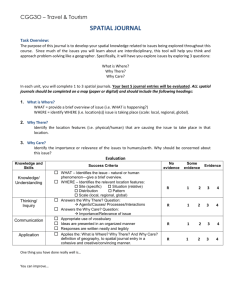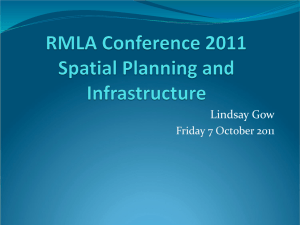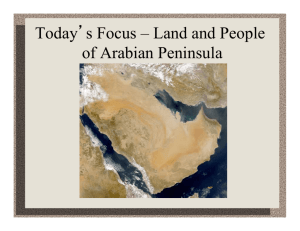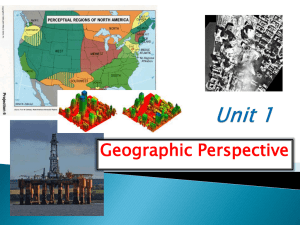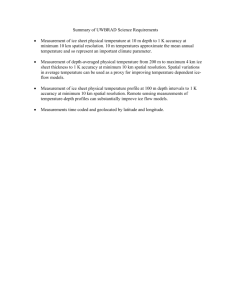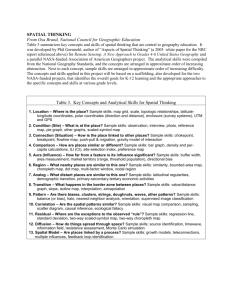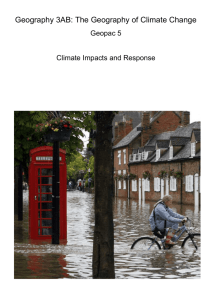Geographic Theory - University of St. Thomas
advertisement
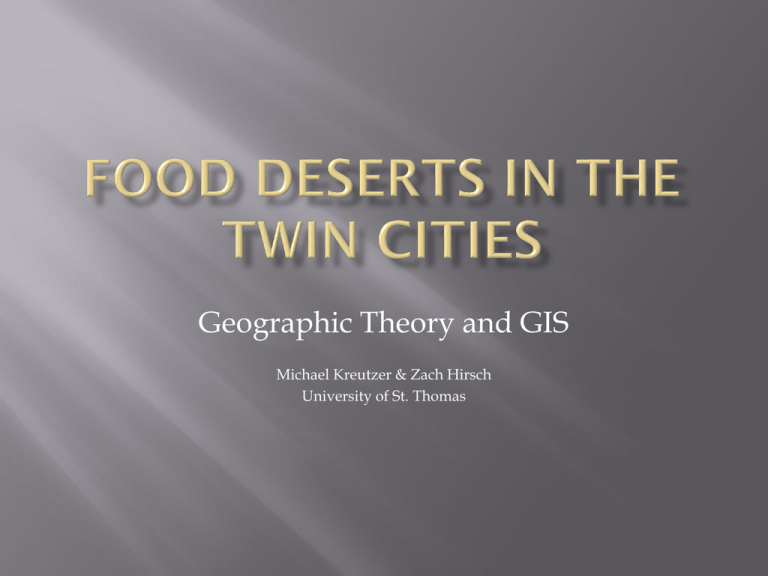
Geographic Theory and GIS Michael Kreutzer & Zach Hirsch University of St. Thomas Food desert: low socioeconomic status limited access to healthy and affordable food So what? Friction of Distance Study: 3 years of diet related deaths People in food deserts are more likely to die prematurely from poor diets Study: Introduction of large retailer to food desert “The significant shifting away from limited range/budget stores as the main source of fruit and vegetable purchasing that we have observed in the post-intervention period lends support to the view that in the pre-intervention period these respondents were in fact constrained by physical and economic access to this type of store.” ⁴ http://ezpcfix.org GIS Analysis Reference USA Distance Calculation Density Demographics Diversity Index Low Diversity High Diversity PCI 2000 0 - $18,000 $18,000 - $28000 $28,000 - $44,000 $44,000 - $95,000 Education Rates Low Education High Education John F. Kain, 1968 Housing Discrimination Movement of entry-level jobs Early 1990s, 87% of the new jobs in the lowerskilled service and retail trade sectors were created in the suburbs These low-skilled jobs can serve as a first step in breaking the cycle of poverty (U.S. Department of Housing and Urban Development 1997) The suburban flight of retailers has left urban areas with small grocers and fast food restaurants as the main sources of nutrition, especially in minority neighborhoods Social groupings Created by uneven distribution of power and resources Spatial patterns are a direct result from these social groupings It’s not as important to recognize where these spatial groupings occur, but rather how space itself creates a structure that shapes society • “Where marginalized groups live is not simply a reflection of a history of social exclusion. In addition, this positioning actively reflects future employment and housing options… so what was a spatial reflection of economic and social marginality becomes a spatial constraint on economic advance and social mobility”² Graphic courtesy of Susan J Smith • • Agency: “The capabilities of particular human beings to pursue certain courses of action”¹ Structure: “Social contexts and constraints within which [human] actions [are] situated” Farmers Markets? ¹ Cloke, Paul; Crang, Philip; Goodwin, Mark. (1999) Structure-agency. Introducing Human Geographies. *Needs more citation ² Smith, Susan J. (1999) Society-space. Introducing Human Geographies. ³ Larsen, Kristian; Gilliand, Jason. (2008 April) Mapping the evolution of ‘food deserts’ in a Canadian city: Supermarket accessibility in London, Ontario, 1961-2005. International Journal of Health Geographics. ⁴ Wrigley, N., Warm, D., Margetts, B., & Whelan, A. (2002, October). Assessing the Impact of Improved Retail Access on Diet in a 'Food Desert': A Preliminary Report. Urban Studies Whelan, A., Wrigley, N., Warm, D., & Cannings, E. (2002, October). Life in a 'Food Desert'. Urban Studies Akiko S. Hosler, Deepa T. Rajulu, Adrienne E. Ronsani, and Bonnie L. Fredrick. "Assessing Retail Fruit and Vegetable Availability in Urban and Rural Underserved Communities." Preventing Chronic Disease Vol 5 (2008). Elizabeth A. Baker, Mario Schootman, Ellen Barnidge, and Cheryl Kelly. “The Role of Race and Poverty in Access to Foods That Enable Individuals to Adhere to Dietary Guidelines.” Preventing Chronic Disease Vol 3 (2006). Miller, Lynne. "Study Finds Dearth of Mainstream Supermarkets in Metro Detroit." Supermarket News 55.27(July 2, 2007) "Healthy foods harder to find in poor neighborhoods; wealthier areas offer residents more nutritious items in stores, studies find.(Report)." Consumer Health News (English) (March 6, 2009) Ihlanfeldt, Keith R. and Sjoquist, David L. (1998) The Spatial Mismatch Hypothesis: A Review of Recent Studies and Their Implications for Welfare Reform. Housing Policy Debate • Volume 9, Issue 4 849. Fannie Mae Foundation. Smelser, Neil J. ; Wilson, William J.; Mitchell, Faith. (2001) America Becoming. National Research Council, Commission on behavioral & social sciences. National Academic Press. Data Sources: Reference USA online directory; ESRI Blockgroup Data.
